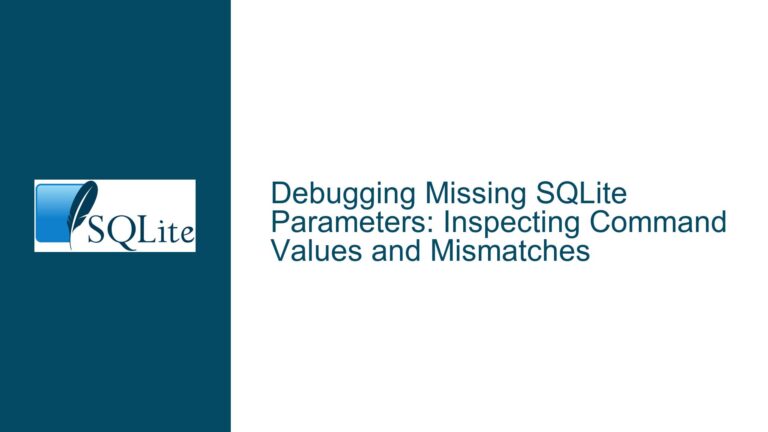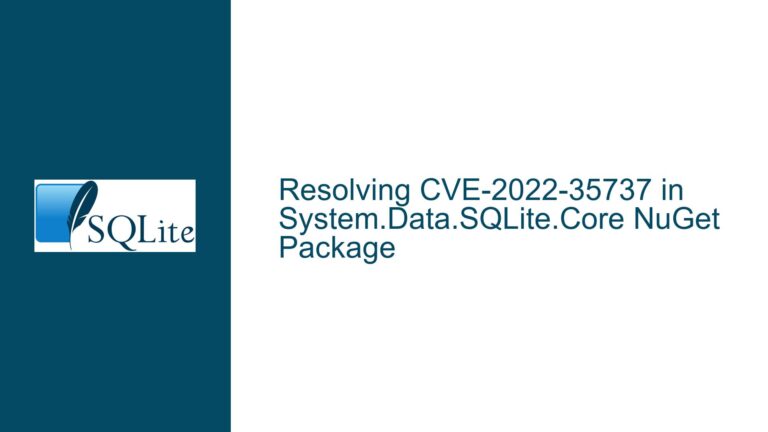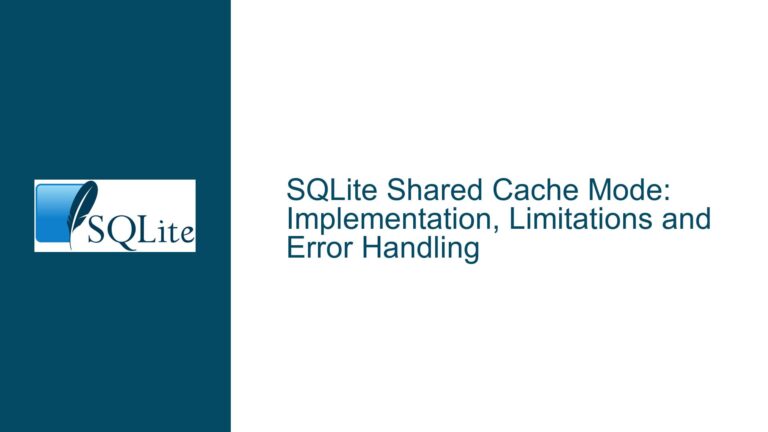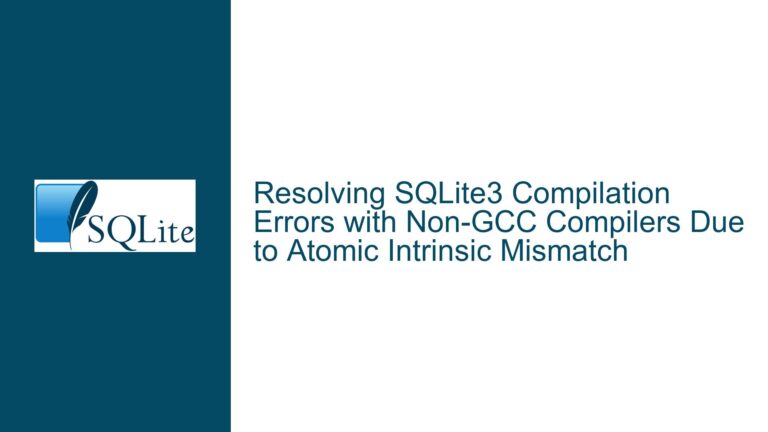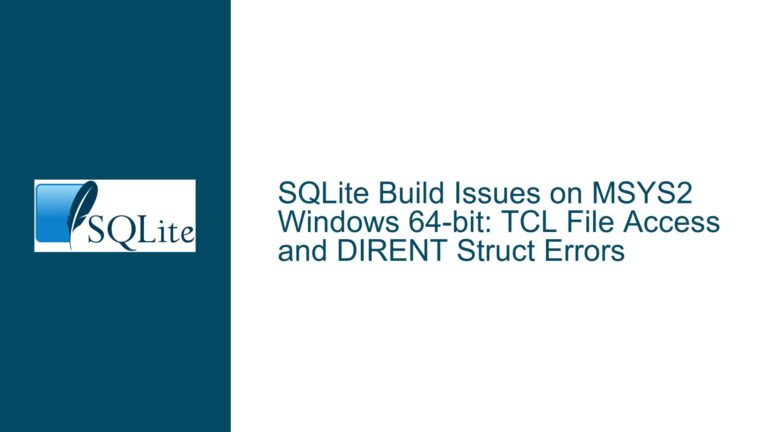Potential NULL Pointer Dereferences in SQLite Expression Parsing Functions
SQLite Expression Parsing and NULL Pointer Dereference Risks
The core issue revolves around the potential for NULL pointer dereferences in SQLite’s expression parsing functions, particularly in the context of the sqlite3ExprSkipCollateAndLikely function. This function is designed to skip over certain types of nodes in an expression tree, such as TK_COLLATE operators and unlikely(), likelihood(), or likely() functions. The concern arises from the possibility that this function might return a NULL pointer, which could lead to dereferencing NULL pointers in subsequent code, causing undefined behavior or crashes.
The sqlite3ExprSkipCollateAndLikely function is used extensively across various parts of the SQLite codebase, including in functions like resolveCompoundOrderBy, findIndexCol, isDistinctRedundant, indexMightHelpWithOrderBy, exprToRegister, and sqlite3ExprCodeTemp. In each of these contexts, the function is called with an expression pointer, and the returned value is immediately used without any NULL checks. This pattern raises the question of whether the function could ever return NULL and, if so, whether the calling code is prepared to handle such a scenario.
The function’s behavior is documented in its comment header, which states that it skips over certain types of nodes in an expression tree and returns the resulting expression. Importantly, the function does not allocate any memory; it merely walks the expression tree and returns a pointer to a node within that tree. This means that the function cannot return NULL due to an allocation failure. However, it could return NULL if it is passed a NULL pointer or if the expression tree contains NULL nodes.
The concern about NULL pointer dereferences is not entirely unfounded. In complex systems like SQLite, where expression trees are manipulated extensively, there is always a risk that an invariant might be violated, leading to unexpected NULL pointers. For example, if the parser or some other part of the code incorrectly constructs an expression tree with NULL nodes, or if a NULL pointer is passed to sqlite3ExprSkipCollateAndLikely, the function could return NULL, leading to a dereference in the calling code.
Interrupted Expression Tree Manipulation and Invariant Violations
The potential for NULL pointer dereferences in SQLite’s expression parsing functions can be attributed to several possible causes, primarily related to the manipulation of expression trees and the maintenance of invariants within the codebase.
One possible cause is the incorrect construction of expression trees. SQLite’s parser is responsible for constructing expression trees from SQL statements. If the parser incorrectly constructs an expression tree, it might include NULL nodes where they are not expected. For example, if the parser encounters an error or an unexpected token, it might insert a NULL node into the expression tree. When such a tree is passed to sqlite3ExprSkipCollateAndLikely, the function could return NULL, leading to a dereference in the calling code.
Another possible cause is the violation of invariants during expression tree manipulation. SQLite’s codebase includes various functions that manipulate expression trees, such as sqlite3ExprDelete, sqlite3ExprDup, and sqlite3ExprCollSeq. These functions are responsible for maintaining the integrity of expression trees, ensuring that they do not contain NULL nodes where they are not expected. If an invariant is violated—for example, if a function deletes a node from an expression tree but fails to update the parent node’s pointer—the resulting tree might contain NULL nodes. When such a tree is passed to sqlite3ExprSkipCollateAndLikely, the function could return NULL, leading to a dereference in the calling code.
A third possible cause is the handling of out-of-memory (OOM) conditions. SQLite is designed to handle OOM conditions gracefully, but if an OOM condition occurs during the construction or manipulation of an expression tree, it might result in a NULL pointer being passed to sqlite3ExprSkipCollateAndLikely. For example, if an attempt to allocate memory for a new expression node fails, the function constructing the tree might return NULL, which could then be passed to sqlite3ExprSkipCollateAndLikely. If the calling code does not check for NULL pointers, this could lead to a dereference.
Finally, the issue might be related to the use of static analysis tools. Static analysis tools are designed to detect potential issues in code, such as NULL pointer dereferences, by analyzing the code without executing it. However, these tools can sometimes produce false positives, especially in complex codebases like SQLite. The static analyzer used in this case might have flagged the potential for NULL pointer dereferences in sqlite3ExprSkipCollateAndLikely without fully understanding the context in which the function is used. This could lead to unnecessary changes being made to the code, such as adding NULL checks that are never actually needed.
Implementing Defensive Programming and Code Simplification
To address the potential for NULL pointer dereferences in SQLite’s expression parsing functions, several steps can be taken to ensure the robustness and correctness of the code. These steps include implementing defensive programming practices, simplifying the code to make it easier to understand and prove correct, and using macros to document and enforce invariants.
The first step is to implement defensive programming practices. Defensive programming involves writing code that is resilient to unexpected conditions, such as NULL pointers. In the context of sqlite3ExprSkipCollateAndLikely, this could involve adding NULL checks to ensure that the function never returns NULL in contexts where it is not expected. However, as noted in the discussion, adding NULL checks to every call site would be redundant and could lead to unreachable branches, which would fail branch coverage testing. Instead, the checks should be added in a way that documents and enforces the invariants of the code.
One way to do this is to use the NEVER() and ALWAYS() macros provided by SQLite. These macros are used to document conditions that are always true or always false, respectively. By wrapping NULL checks in these macros, the code can be made more robust without introducing unreachable branches. For example, if it is known that sqlite3ExprSkipCollateAndLikely can never return NULL in a particular context, the check can be wrapped in ALWAYS() to document this fact and ensure that the branch is not considered unreachable by the branch coverage testing.
Another step is to simplify the code to make it easier to understand and prove correct. Complex code is more prone to errors and harder to analyze, both by humans and by static analysis tools. By simplifying the code, the potential for NULL pointer dereferences can be reduced. For example, if the code that constructs and manipulates expression trees can be simplified, the risk of introducing NULL nodes where they are not expected can be minimized. This might involve refactoring the code to reduce the number of places where expression trees are manipulated, or to make the manipulation more straightforward and less error-prone.
A third step is to use macros to document and enforce invariants. Macros can be used to encapsulate common patterns and ensure that they are used consistently throughout the codebase. For example, a macro could be defined to check for NULL pointers and handle them in a consistent way. This would reduce the risk of NULL pointer dereferences by ensuring that all code that deals with expression trees follows the same pattern. Additionally, macros can be used to document the invariants of the code, making it easier for developers to understand and maintain the code.
Finally, it is important to consider the role of static analysis tools in identifying potential issues. While static analysis tools can be useful for detecting potential problems, they are not infallible and can produce false positives. In the case of sqlite3ExprSkipCollateAndLikely, the static analyzer might have flagged potential NULL pointer dereferences without fully understanding the context in which the function is used. Therefore, it is important to carefully review the results of static analysis and consider the context in which the code is used before making changes. In some cases, it might be necessary to suppress false positives or to adjust the analysis to better reflect the actual behavior of the code.
In conclusion, the potential for NULL pointer dereferences in SQLite’s expression parsing functions is a complex issue that requires careful consideration of the code’s invariants and the context in which it is used. By implementing defensive programming practices, simplifying the code, using macros to document and enforce invariants, and carefully reviewing the results of static analysis, the robustness and correctness of the code can be improved, reducing the risk of NULL pointer dereferences and other potential issues.

